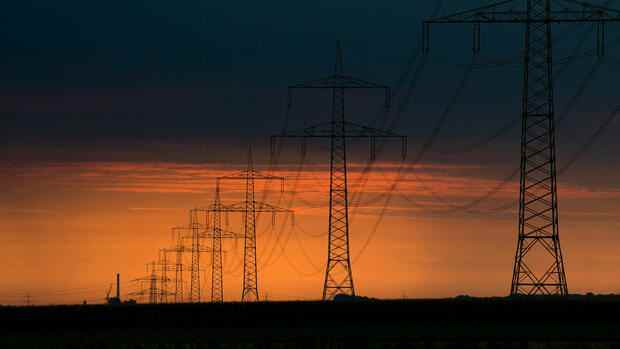The power lines between the EU countries are not yet sufficiently developed.
(Photo: dpa)
Brussels France and Spain are putting the EU Commission under pressure to reform the electricity market. At a meeting of energy ministers, Spain demanded that consumers pay an average price of what it costs to produce with different energy sources.
The price on the electricity market is currently developing in such a way that even the most expensive producers do not make a loss. These are currently the gas-fired power plants because of the high gas prices. In addition, the Spanish State Secretary for Energy, Sara Munoz, spoke out in favor of capping gas prices.
However, Germany and eight other countries warned in a letter against such interventions in the market. It says that competition is good for innovation and security of supply. He also delivers the best prices for consumers. “We shouldn’t stir up excessive expectations of short-term options for action at EU level,” said German State Secretary Andreas Feicht. “We cannot influence the world market prices for gas, oil and coal.”
If the EU artificially lower the price of electricity, it would no longer be worthwhile for the operators of gas-fired power plants to start their systems, said the Luxembourg energy minister Claude Turmes. The ships that are supposed to bring liquefied gas to Europe would then turn off and unload their cargo in Asia.
Top jobs of the day
Find the best jobs now and
be notified by email.
Gas and electricity are freely traded in an EU-wide internal market. That is why prices are similar across Europe in wholesaling. As long as electricity produced with gas has to be fed into the grid in order to meet demand, this drives the electricity price up. The more expensive gas is, the more expensive electricity is.
Form of reform still open
How exactly the energy market reforms should be designed according to Spain remains open. Diplomats in Brussels say they find it hard to imagine such a reform without damaging the internal market.
Should Spain and France manage to keep electricity from gas-fired power stations alone and other electricity cheap, this would remove the incentive to invest in clean energy. Because the cheap wind turbines would then have to cross-finance the expensive electricity produced with gas.
However, Spain sees the connection the other way around: If more clean energy is to be generated, the citizens would also have to benefit from the clean energy, i.e. pay low electricity prices.
On the contrary, a better functioning internal market is needed to cushion the extreme price fluctuations, says the other side. There is a lack of electricity and gas lines from Central Europe to Spain and Portugal, which can drive the prices of the actually Europeanized market apart. There is a lack of cross-border infrastructure, says CSU MEP Markus Ferber.
The Luxembourg energy minister Turmes warned not to cut back climate protection efforts because of the current crisis. Investments in energy efficiency and renewable energies would significantly reduce dependence on gas in the coming years.
European solutions or home-made problem?
Spain insists on European solutions. Turmes, who has been involved in energy markets since the 1990s, sees the problem as homemade: Portugal has to suffer much less from fluctuating energy prices under the same conditions.
The reason for this is that longer-term supply contracts are concluded in Portugal. In Spain, on the other hand, prices for consumers are linked to the spot market. That is why even small businesses and private households feel the fluctuations on the world market immediately.
Energy Commissioner Kadri Simson promised to have the first results of the commissioned analysis for the electricity, gas and emissions certificate market by the next meeting in December. Several member states had requested that speculation in these markets be contained and possible manipulation excluded.
Simson also wants to examine the joint procurement of gas and the creation of a European emergency reserve. However, there are significant practical obstacles that have resulted in many similar attempts remaining unsuccessful. The purchase of gas has so far been regulated very differently in the Member States. In Germany, this is the responsibility of the energy supplier and not the state.
More: Nine lessons Europe should learn from the gas price crisis

